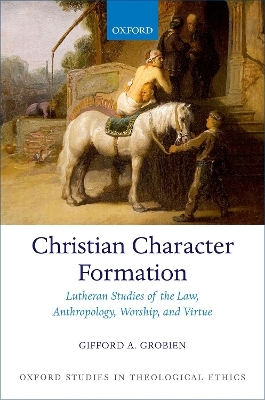
Christian Character Formation
Lutheran Studies of the Law, Anthropology, Worship, and Virtue
Seiten
2019
Oxford University Press (Verlag)
978-0-19-874619-5 (ISBN)
Oxford University Press (Verlag)
978-0-19-874619-5 (ISBN)
This work investigates worship and formation in view of Christian anthropology, particularly union with Christ.
Christian Character Formation investigates worship and formation in view of Christian anthropology, particularly union with Christ. Traditions which value justification by faith wrestle to some degree with how to describe and encourage ethical formation when salvation and righteousness are presented as gracious and complete. The dialectic of law and gospel has suggested to some that forgiveness and the advocacy of ethical norms contend with each other. By viewing justification and formation in light of Christ's righteousness which is both imputed and imparted, it is more readily seen that forgiveness and ethics complement each other. In justification, God converts a person, by which he grants new character. Traditional Lutheran anthropology says that this regeneration grants a new nature in mystical union with Jesus Christ.
By exploring the Finnish Luther School led by Tuomo Mannermaa, Gifford A. Grobien explains how union with Christ imparts righteousness and the corresponding new character to the believer. Furthermore, as means of grace, the Word and sacraments are the means of establishing union with Christ and nurturing new character. Considering Oswald Bayer's "suffering" the word of Christ, Louis-Marie Chauvet's "symbolic order" and Bernd Wannenwetsch's understanding of worship as Christianity's unique "form of life," Grobien argues that worship practices are the foundational and determinative context in which grace is offered and in which the distinctively Christian ethos supports virtues consistent with Christian character. This understanding is also coordinated with Stanley Hauerwas's narrative ethics and Luther's teaching of virtue and good works in view of the Ten Commandments.
Christian Character Formation investigates worship and formation in view of Christian anthropology, particularly union with Christ. Traditions which value justification by faith wrestle to some degree with how to describe and encourage ethical formation when salvation and righteousness are presented as gracious and complete. The dialectic of law and gospel has suggested to some that forgiveness and the advocacy of ethical norms contend with each other. By viewing justification and formation in light of Christ's righteousness which is both imputed and imparted, it is more readily seen that forgiveness and ethics complement each other. In justification, God converts a person, by which he grants new character. Traditional Lutheran anthropology says that this regeneration grants a new nature in mystical union with Jesus Christ.
By exploring the Finnish Luther School led by Tuomo Mannermaa, Gifford A. Grobien explains how union with Christ imparts righteousness and the corresponding new character to the believer. Furthermore, as means of grace, the Word and sacraments are the means of establishing union with Christ and nurturing new character. Considering Oswald Bayer's "suffering" the word of Christ, Louis-Marie Chauvet's "symbolic order" and Bernd Wannenwetsch's understanding of worship as Christianity's unique "form of life," Grobien argues that worship practices are the foundational and determinative context in which grace is offered and in which the distinctively Christian ethos supports virtues consistent with Christian character. This understanding is also coordinated with Stanley Hauerwas's narrative ethics and Luther's teaching of virtue and good works in view of the Ten Commandments.
Gifford A. Grobien is Associate Professor of Systematic Theology at Concordia Theological Seminary.
List of Abbreviations
1: Christian Righteousness: Justification by Faith and Ethical Formation
2: The Problem of the Divine Law in Christian Ethics
3: Twofold Righteousness in Early Lutheranism
4: Character Formation: A Proposal for the "Problem" of the Law
5: Union with Christ and its bearing on New Character
6: Personhood and Righteousness in Communion with Christ
7: Formation in Christian Worship
8: Christian Virtue and "Meta-virtues" Lutheran Virtue Ethics
9: Virtue, Community, and Instruction for Ethical Formation
Bibliography
| Erscheinungsdatum | 22.05.2019 |
|---|---|
| Reihe/Serie | Oxford Studies in Theological Ethics |
| Verlagsort | Oxford |
| Sprache | englisch |
| Maße | 142 x 222 mm |
| Gewicht | 462 g |
| Themenwelt | Geisteswissenschaften ► Philosophie ► Ethik |
| Religion / Theologie ► Christentum ► Kirchengeschichte | |
| Religion / Theologie ► Christentum ► Liturgik / Homiletik | |
| Sozialwissenschaften ► Soziologie | |
| ISBN-10 | 0-19-874619-9 / 0198746199 |
| ISBN-13 | 978-0-19-874619-5 / 9780198746195 |
| Zustand | Neuware |
| Informationen gemäß Produktsicherheitsverordnung (GPSR) | |
| Haben Sie eine Frage zum Produkt? |
Mehr entdecken
aus dem Bereich
aus dem Bereich
eine Geschichte der christlichen Kunst
Buch | Hardcover (2024)
C.H.Beck (Verlag)
CHF 46,90
von Athanasius bis Gregor dem Großen
Buch | Softcover (2024)
C.H.Beck (Verlag)
CHF 18,90


